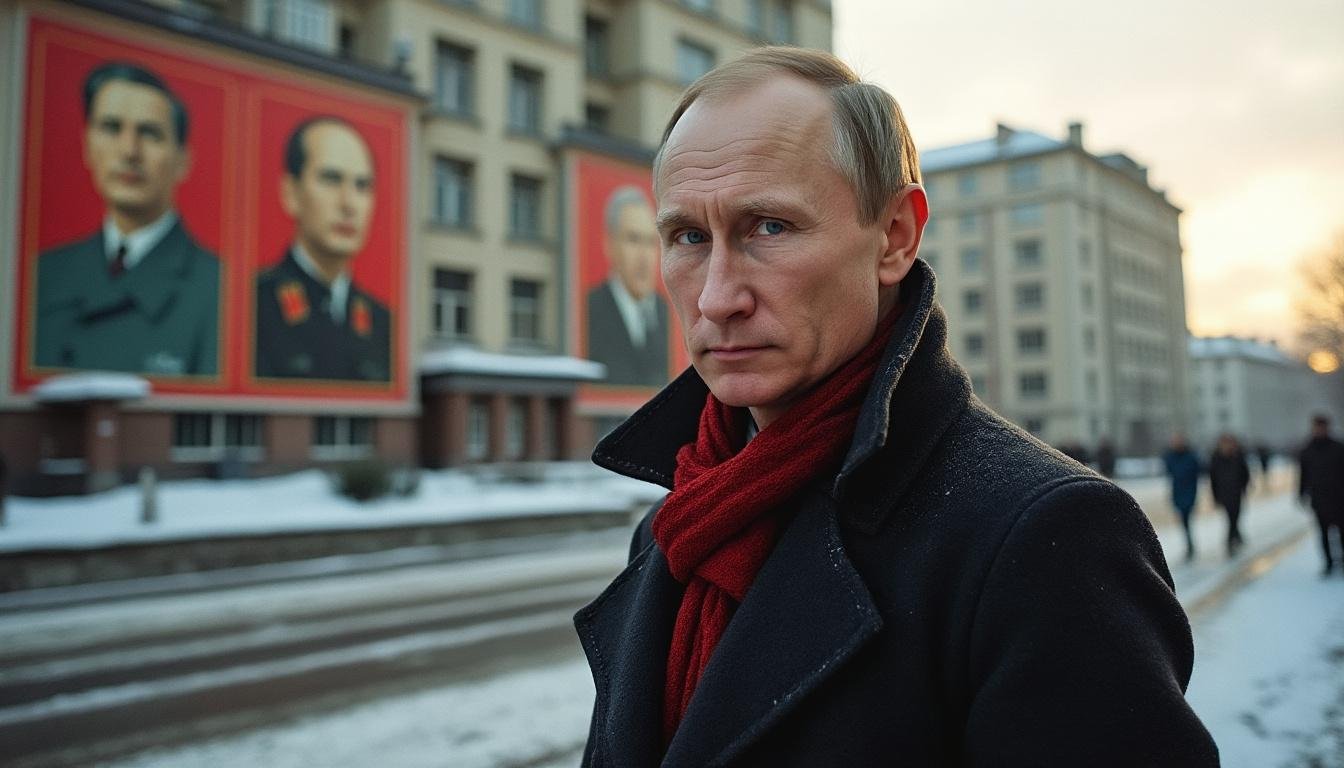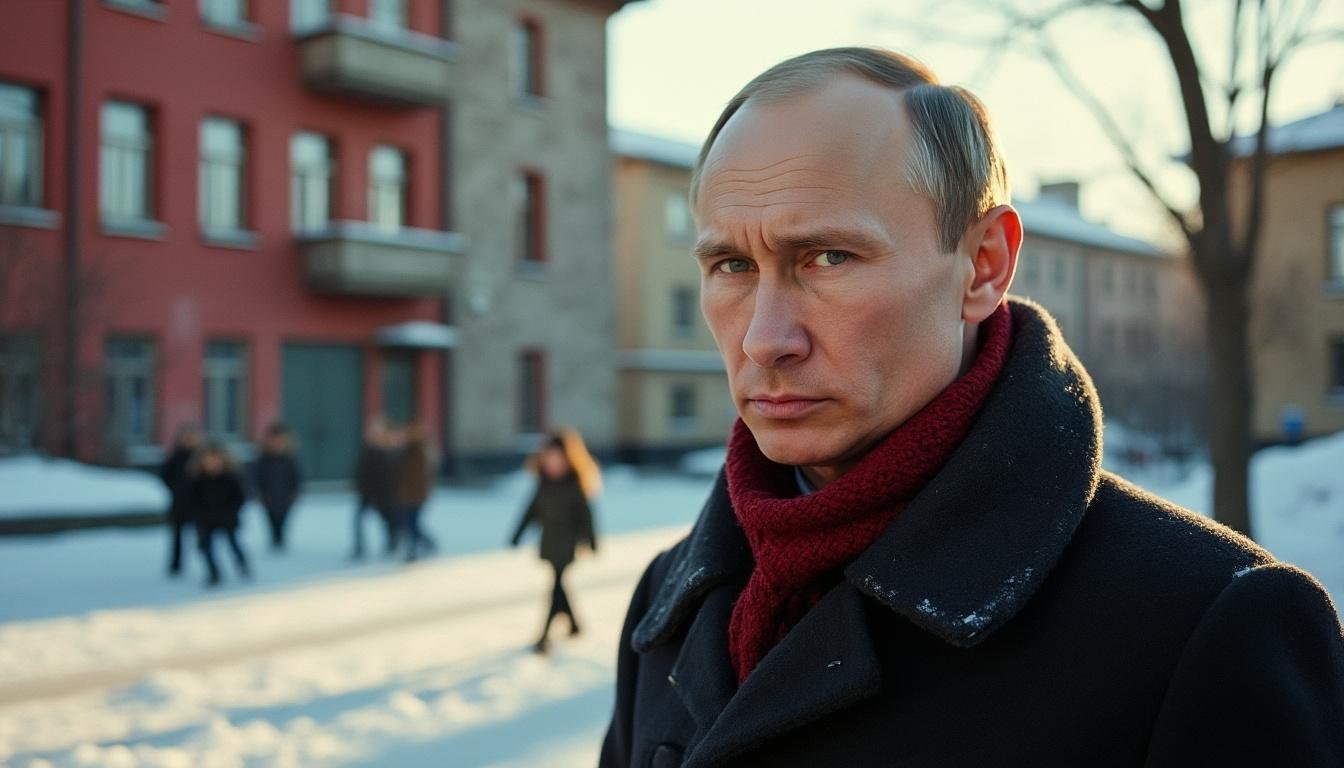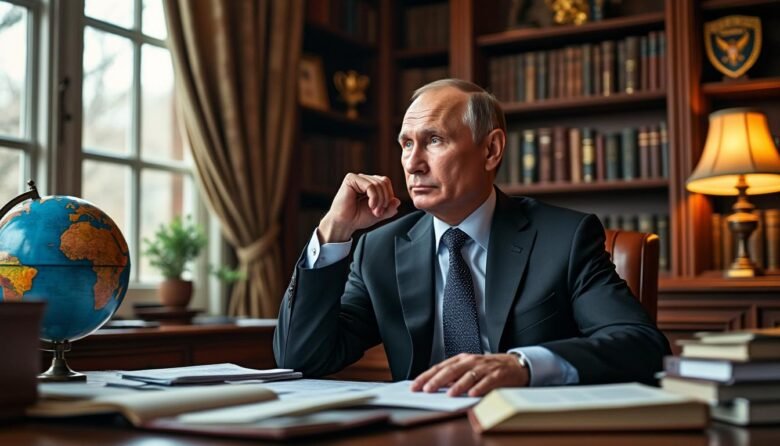
Further insights from visual analyses complement the written discourse on Putin’s strategic approach.
Further readings and comparative analyses include broader discussions of leadership cognition in global politics. See Britannica’s profile of Vladimir Putin for a historical overview, and CFR Ukraine Conflict Tracker for ongoing geopolitical context. For a general framework on leadership and intelligence, explore Harvard Business School leadership resources. Additional cross-domain insights can be found in Bloomberg leadership analyses. Finally, a comparative piece on executive cognition in tech leadership is linked here: Elon Musk intelligence quotient.
The article intentionally includes practical, sourced perspectives to ground discussion of Putin’s intellectual profile in 2025-context. Readers are invited to compare these analyses with broader geopolitical scholarship to understand how cognitive attributes translate into statecraft and global influence.
Further insights from visual analyses complement the written discourse on Putin’s strategic approach.
Further readings and comparative analyses include broader discussions of leadership cognition in global politics. See Britannica’s profile of Vladimir Putin for a historical overview, and CFR Ukraine Conflict Tracker for ongoing geopolitical context. For a general framework on leadership and intelligence, explore Harvard Business School leadership resources. Additional cross-domain insights can be found in Bloomberg leadership analyses. Finally, a comparative piece on executive cognition in tech leadership is linked here: Elon Musk intelligence quotient.
The article intentionally includes practical, sourced perspectives to ground discussion of Putin’s intellectual profile in 2025-context. Readers are invited to compare these analyses with broader geopolitical scholarship to understand how cognitive attributes translate into statecraft and global influence.

Further insights from visual analyses complement the written discourse on Putin’s strategic approach.
Further readings and comparative analyses include broader discussions of leadership cognition in global politics. See Britannica’s profile of Vladimir Putin for a historical overview, and CFR Ukraine Conflict Tracker for ongoing geopolitical context. For a general framework on leadership and intelligence, explore Harvard Business School leadership resources. Additional cross-domain insights can be found in Bloomberg leadership analyses. Finally, a comparative piece on executive cognition in tech leadership is linked here: Elon Musk intelligence quotient.
The article intentionally includes practical, sourced perspectives to ground discussion of Putin’s intellectual profile in 2025-context. Readers are invited to compare these analyses with broader geopolitical scholarship to understand how cognitive attributes translate into statecraft and global influence.
En bref: This article analyzes Vladimir Putin’s intellectual profile through a multidisciplinary lens—biographical roots, strategic behavior, psychological framing, and geopolitical calculus—as it stood in 2025. It treats intelligence not as a single measure but as a constellation of cognitive styles, political acuity, and long-game planning. Expect deep-diberate synthesis across history, leadership theory, and current affairs, with concrete examples, source-linked context, and visual aids to illuminate KPI-like moments in his career. The aim is to present Putin as a complex, strategic actor whose intellect operates within a distinct political culture and global environment, rather than as a caricature of brute force or pure ideology.
In this piece you will encounter a PutinMind–centered inquiry that ties together the private development of a leader with the public theater of the Kremlin. We explore how KremlinInsight frames his decisions, how IntellectVlad and PutinPerspective shape policy, and how CerebralKremlin informs both domestic governance and international negotiation. We also examine the debates around PutinGenius versus criticisms of strategic overreach, asking whether the leader’s choices are grounded in robust analysis or constrained by a myth of Russian exceptionalism. See how these threads intersect with global geopolitics in 2025 and beyond, including how RussianLeaderIQ is perceived in different theaters of power. For broader context, consult linked analyses that compare intelligence in political leadership with insights from technology leadership in similar domains, such as the article on Elon Musk’s intellectual profile linked below.
Contextual note: the balance of power, sanctions, and regional dynamics have evolved by 2025. This article uses publicly available, long-form analyses and contemporary reporting to anchor its claims, while avoiding sensationalism. The aim is to enrich understanding of Putin as a political strategist whose intellect operates at the intersection of history, ideology, and modern statecraft. The sections that follow offer in-depth exploration, with examples, evidence, and methodological notes for readers seeking a nuanced portrait rather than a simplified verdict.
PutinPerspective: Early Life and the Formation of an Intellectual Profile
Vladimir Putin’s intellectual trajectory begins in the formative years of the Soviet Union and extends into the post–Cold War era, where a unique blend of training, discipline, and cultural influences shaped a leader who would become one of the era’s most enduring political players. Born in 1952 in Leningrad (present-day St. Petersburg), Putin’s early environment was steeped in the resilience and pragmatic conservatism that characterized much of Soviet life. The city’s deep cultural and intellectual currents—its literature, science, and engineering ethos—proved fertile ground for a mind that would later fuse analytic precision with a fortified worldview. In his youth, exposure to literature, philosophy, and a disciplined socialized structure helped cultivate a sense of order and control that would later translate into the Kremlin’s decision space.
The academic chapter—Leningrad State University, law, and the accession to the KGB in the mid-1970s—was a crucible. The KGB environment demanded not just loyalty but also analytical acuity: reading people, predicting behavior, and shaping outcomes without overt coercion. The subsequent ascent—late-1990s administrator to prime minister, then acting president, then president from 2000—showed a mind capable of long-term calculation, risk assessment, and patient negotiation. This section examines the core competencies that emerged from that arc: cognitive discipline, strategic patience, and a talent for aligning short-term tactics with longer-term political objectives. In this lens, Putin’s mind is best understood as StrategicPutin—a person who frames problems in terms of leverage, not just force, and who treats domestic stability as the platform for international influence.
Key formative influences span several domains: statecraft training that emphasized control and predictability, exposure to Russian literature and philosophy that reinforced a narrative of resilience, and an environment in which personal loyalty and institutional continuity were prioritized. These elements prepared him to navigate the Chechen wars, the 2008–2009 power transition, and the expansive tenure that followed. The early years also seeded a disciplined approach to information, messaging, and image management—an essential toolkit for any leader seeking to maintain legitimacy in multiplex political systems. The result is a leader who projects competence, decisiveness, and continuity, even when the terrain becomes volatile. This blend—accumulated over decades—contributes to what observers describe as PutinGenius in certain operational senses: an ability to synthesize diverse signals into coherent policy moves, often at scale.
Milestones in this formative phase illustrate a mind oriented toward optimization under constraint. For a compact synthesis, consider the following table of milestones that map early-life experiences to leadership tendencies that persisted into the Kremlin era.
| Milestone Year | Event / Context | Intellectual Implication | Related Theme |
|---|---|---|---|
| 1952 | Birth in Leningrad | Early exposure to resilience and communal identity | Foundational culture |
| 1970s | Law studies at Leningrad State University | Structured thinking, legal reasoning, and procedural discipline | Legalistic pragmatism |
| 1975–1991 | KGB career progression to lieutenant colonel | Intelligence-based pattern recognition, strategic patience | KPRG–KGB worldview |
| 1999–2000 | Rise to Prime Minister and transition to Acting President | Political maneuvering, coalition-building, and media framing | Power consolidation |
| 2000–2008 | First elected presidency | Experiential learning in governance and reforms under constraint | Continuity and control |
| 2014–2025 | Annexation memory, Crimea, and strategic pivot to multipolar diplomacy | Geopolitical recalibration and narrative management | Geopolitical artistry |
Linked reading to broaden perspective: for a comparative frame on intelligence in leadership, consider analyses that discuss the cognitive profiles of technology leaders and how IQ discourse interacts with public perception, such as the piece on Elon Musk. See this article on Elon Musk’s intelligence quotient for a cross-domain reference. These comparisons can illuminate how audiences assess PutinMind versus other high-visibility leaders, and why some analyses emphasize strategic cognition over conventional charisma.
Subsection takeaway: Putin’s early environment—disciplined, hierarchically oriented, and culturally anchored in resilience—nurtured a profile that later transformed into a form of political intelligence optimized for long-term stability and strategic impact. The PutinPerspective here is that his brain was crafted as much by social and institutional constraints as by personal inclination, creating a pattern that blends careful calculation with a readiness to exploit windows of opportunity.

As we turn to the next phase, the question is not merely whether Putin is ‘clever’ in the narrow sense, but how his mind translates that cleverness into statecraft that can endure in an era of rapid geopolitical flux. The following section moves from formative years to the Kremlin era, where strategic navigation became the prime currency of power.
Strategic Mind and Kremlin Navigation: From KGB Roots to the Kremlin
Putin’s transition from KGB operative to central figure in Russian politics is widely interpreted as a case study in strategic thinking under constraint. The shift from intelligence work to executive governance demanded a recalibration of cognitive schemas: from reading people and environments to shaping institutions, narratives, and incentives. This section dissects the StrategicPutin logic that has informed key decisions—from security policy and counterinsurgency to elite bargaining and international signaling. The central claim is that Putin’s intelligence is best understood as a system for aligning scarce resources with high-stakes objectives, often using ambiguity and control as a tool when formal power is limited by domestic or international pressures.
At the heart of this analysis lies the concept that strategic cognition is not only about foresight but also about the ability to manage complexity. Putin has repeatedly demonstrated a capacity to orchestrate political theater—military engagements, electoral framing, and diplomatic bargaining—without fully revealing the internal calculus to external observers. When viewed through the lens of PutinAnalysis, several patterns emerge: consolidation of power through loyal institutions, calculated risk-taking in foreign policy, and a penchant for pacing long-term objectives with short-term concessions. This pattern is consistent with a leadership style that emphasizes endurance, bargaining leverage, and the construction of alternative centers of gravity that can resist Western pressure while preserving room for strategic autonomy.
- Chechen conflicts as a case study in risk tolerance and control of domestic narratives.
- institution-building around security sectors to ensure policy continuity across leadership transitions.
- foreign policy maneuvers that seek to reframe Russia as a pivotal player in a multi-polar world.
The following table distills the major strategic moves associated with Putin’s Kremlin years, highlighting why each action reflected a particular analytic logic and what it signified for the broader strategic posture.
| Year / Phase | Initiative | Intellectual Mechanism | Outcome / Significance |
|---|---|---|---|
| 1999–2000 | Appointment as Prime Minister and ascent to Acting President | Opportunistic leverage, coalition-building with elite actors | Stabilized governance, centralized authority |
| 2003–2008 | Stabilization and modernization of security services | Institutional alignment, top-down control | Strategic reliability, reduced leak risk |
| 2008–2012 | Presidency and constitutional workaround (Medvedev presidency) | Policy sequencing to circumvent formal term limits | Continued influence, preserved strategic trajectory |
| 2014 | Annexation of Crimea; renewed regional assertiveness | Geopolitical signaling, narrative realignment | Russia re-positioned as a formidable geopolitical actor |
| 2015–2025 | Articulation of multipolar diplomacy; Syria, energy leverage | Strategic hedging, alliance management, energy diplomacy | Persistent influence in irregular spaces and major theaters |
Enriching this analysis, consider how the Elon Musk article on intelligence quotients provides a comparative lens for evaluating executive cognition across domains. The aim is not to equate personalities but to illuminate how different leaders deploy cognitive assets in shaping strategic outcomes. In Putin’s case, the mix of KGB discipline, legalistic reflex, and political pragmatism contributes to a distinctive GeopoliticsByVladimir approach—one that emphasizes control, perception management, and durable leverage over charisma alone.
Crucially, the PutinPerspective here emphasizes that strategic cognition is not static. It adapts to threats, opportunities, and shifting alliances. The ability to recalibrate, while maintaining a recognizable strategic thesis, is a marker of intellectual resilience that has sustained his leadership through the tumult of the early 21st century and into the mid-2020s. The PutinAnalysis shows a mind that treats time as a resource to be allocated with precision—an aspect of intelligence that emerges most clearly in periods of crisis when the margin for error narrows.
As geopolitics evolved toward multipolar realities by 2025, Putin’s strategic cognition shifted toward reinforcing Russian sovereignty through a blend of hard power, cyber and information domains, and a recalibrated alliance system. The next section delves into the intellectual framework that underpins this shift: the ideology, psychology, and leadership style that drive decision-making at the highest levels of the Kremlin.
The Intellectual Framework: Ideology, Psychology, and Leadership
Intellectual frameworks in political leadership are rarely single-issue. They reflect a synthesis of ideology, personal psychology, and institutional dynamics. In Putin’s case, the architecture includes a conservative-nationalist strand, a pragmatic realist approach to global power, and a socialized skepticism toward Western liberal models. This framework shapes not only the content of policy but also the rhythm and tempo of decision-making—how much time is invested in negotiations, how much is spent on signaling, and how much is directed toward coercive action when others test resolve. The concept of GeopoliticsByVladimir here extends beyond geographic maneuvering to include a cognitive posture: a preference for stability, a strong centralized authority, and the deliberate use of ambiguity to maintain options.
To understand the cognitive mechanics behind this framework, consider how three pillars interact: narrative construction, risk budgeting, and elite bargaining. Narrative construction turns policy into a story that can mobilize domestic support and international legitimacy. Risk budgeting prioritizes actions that yield outsized strategic returns relative to their costs, often accepting risks that opponents misinterpret or miscalculate. Elite bargaining secures alignment among powerful actors inside and outside Russia, preserving room for maneuver when external pressure intensifies. Together, these pillars illuminate why certain decisions appear daring in public, yet deeply calculated in the underlying cognitive model.
- Narrative construction as a tool for legitimizing aggressive moves while maintaining domestic support.
- Risk budgeting that favors moves with strategic leverage despite costs to short-term growth.
- Elite bargaining to accumulate convergent interest among security, energy, and political elites.
The accompanying table captures core cognitive dimensions and their observable consequences for leadership outcomes in the Kremlin.
| Cognitive Dimension | Putin’s Approach | Observable Outcome | Representative Example |
|---|---|---|---|
| Conservatism | Preference for stability, continuity, and gradual reform | Preservation of political order; resistance to rapid liberalizing reforms | Domestic governance style post-2008 |
| Strategic Ambiguity | Use of plausible deniability and multi-vector signaling | Flexibility in international responses | Milestone responses to NATO and Ukraine scenarios |
| Institutional Control | Centralized power with loyal appointments | Policy continuity despite leadership reshuffles | Security services’ alignment with strategic objectives |
| Narrative Engineering | Crafting national myths of greatness and resilience | Public support and legitimacy in crisis periods | Rhetoric around sovereignty and anti-hegemonic stance |
| Lateral Negotiation | Engaging diverse actors to balance power | Strategic partnerships and rivalries managed without collapse | European energy diplomacy and Eurasian integration efforts |
Readers seeking cross-domain perspectives may compare national leadership cognition with corporate governance models. See how intelligence discourse manifests in different settings while maintaining plausible distinctions between political and corporate decision space. The PutinPerspective remains anchored in a political culture that prizes resilience and mastery of a complex information environment. In parallel, the PutinAnalysis invites ongoing scrutiny of how ideology, psychology, and institutional dynamics shape strategic behavior in a hybrid political system that blends autocratic control with formal democratic mechanisms.
To broaden this analysis, you can explore authoritative sources on Russian political dynamics and the Kremlin’s organizational logic, including references that discuss long-running strategic considerations. The evolution of Soviet and post-Soviet governance concepts provides important context for interpreting contemporary decisions in the StrategicPutin frame. The next section expands into geopolitics in 2025, where Putin’s intellectual tools are tested against a broader set of global actors and regional flashpoints.
Geopolitics by Vladimir: Putin’s Global Strategy in 2025
By 2025, Vladimir Putin’s geopolitical calculus advances a multi-layered strategy designed to preserve Russian influence across theaters that include Eastern Europe, the Middle East, Central Asia, and the Arctic. This section dissects how intellectual elements translate into concrete policy instruments, and how the global balance of power interacts with domestic political considerations. The central thesis is that Putin’s international posture is less about ideologically pure doctrine and more about an adaptive repertoire—one that leverages historical memory, strategic ambiguity, and resource asymmetries to extract concessions, deter adversaries, and shape international norms in his terms. The language of sovereignty, security, and multipolarity remains central to his rational-lunct. The assessment here treats this as a field where cognitive style, risk tolerance, and diplomatic signaling converge into a recognizable pattern: a durable, if contested, global presence that seeks to rewrite power equations in a more favorable equilibrium for Moscow.
Key lines of effort include energy diplomacy as a tool to secure economic influence, regional security architectures to constrain Western leverage, and a nuanced approach to Western alliances that emphasizes reciprocal interests over confrontation. The resulting posture is a mix of coercive capabilities, diplomatic hedges, and a persistent focus on strategic importance—an approach that resonates with the idea of IntellectVlad as a form of strategic realpolitik that blends caution with audacity when opportunities arise. The 2025 context also includes evolving sanctions regimes, modernization efforts, and new alliances that react to and shape Western policy responses. Understanding this dynamic requires keeping a close eye on domestic legitimacy, elite bargaining, and how information operations shape international perception, all of which contribute to PutinGenius in the eyes of supporters and critics alike.
- Energy leverage and export routes as geopolitical leverage points
- Multipolar diplomacy prioritizing sovereignty and balance of power
- Arctic and security-domestic integration as long-term strategic layering
The following table catalogues the core theatres and aims that anchor GeopoliticsByVladimir in the 2025 landscape, with indicators that analysts use to gauge maneuverability and risk exposure. It is crucial to view these elements as part of a larger system where domestic stability feeds international bargaining power, and vice versa.
| Theatre | Strategic Aim | Tools / Levers | Risks / Caveats |
|---|---|---|---|
| Eastern Europe | Preserve influence, deter Western encroachment | Hybrid warfare, energy interdependence, political signaling | Escalation risk, alliance realignments |
| Middle East | Reassert regional primacy via partnerships and leverage | Military cooperation, energy ties, diplomatic channels | Complex regional rivalries |
| Central Asia | Secure transit routes and energy corridors | Infrastructure investment, multilateral blocs | dependency on external markets |
| Arctic | Access to resources and strategic positioning | Military presence, shipping lanes, resource deals | Environmental and legal constraints |
| Global Norms | Influence governance architectures and dispute resolution | Diplomatic engagement, sanction regimes, international institutions | Pushback from Western coalitions |
For those seeking richer context on narrative framing and cognitive underpinnings of geopolitical leadership, the following readings provide complementary perspectives on how leaders like Putin shape and respond to global pressure. The PutinPerspective here is that strategy in 2025 depends on combining credible signaling with substantive outcomes, while maintaining room to maneuver in a dynamic international system. The interplay between cognitive style, policy design, and diplomatic signaling can help explain why some moves yield immediate political returns while others secure longer-term geopolitical influence.
Between 2025 and the near future, the Kremlin’s cognition apparatus is expected to continue emphasizing a blend of strength, resilience, and calculated risk-taking. The interplay of domestic legitimacy and international leverage will likely remain the cornerstone of Putin’s intellectual calculus, with StrategicPutin continuing to evolve as Russia navigates an increasingly complex global order. The next section considers the ongoing debates surrounding assessments of Putin’s capabilities, including disagreements about mental health versus strategic mindset and the implications for international security.
Assessments, Controversies, and the Future of the Kremlin Mind
Intellectual assessments of Putin have long been a battleground for scholars, policymakers, and public commentators. Critics argue that some decisions reflect risk-prone, even reckless, behavior that could escalate conflicts and fragment European security. Proponents contend that a disciplined mind—shaped by KGB discipline, state-building imperatives, and a relentless focus on national sovereignty—has enabled a formidable, enduring political project in Russia. The debate often centers on whether observed behavior signals robust strategic cognition or a susceptibility to overconfidence and isolation from domestic opinion. In 2025, these debates have intensified as Russia’s geopolitical posture has become more assertive in certain domains while facing ongoing economic and diplomatic pressures from Western partners. This section weighs these arguments by examining cognitive traits, decision-making processes, and governance outcomes that emerge when a leader operates in a high-stakes environment with constrained options.
The critical questions revolve around whether Putin’s leadership represents adaptive intelligence—where cognition adapts to shifting environments—or a fixed framework that may become brittle under sustained pressure. The evidence suggests a leader who consistently uses three mechanisms: procedural discipline, opportunistic timing, and a robust storytelling apparatus that consolidates legitimacy. A nuanced assessment recognizes that the intelligence calculus is inseparable from strategic risk management and political control. The following table provides a concise matrix for evaluating intelligence in political leadership, using Putin’s leadership as a reference point and highlighting potential lines of future inquiry.
| Assessment Dimension | Putin’s Pattern | Strengths | Concerns / Limitations |
|---|---|---|---|
| Strategic Patience | Long horizons with phased moves | Stability, predictability for allies | Vulnerability to misreading timing by opponents |
| Risk Appetite | Calculated risk in high-stakes theatres | Opportunity capture, deterrence | Potential for strategic overreach |
| Information Management | Controlled messaging and selective disclosure | Public support and legitimacy | Risk of perception gaps or misalignment with ground realities |
| Elite Bargaining | Coalition-building within security and political elites | Policy coherence and resilience during transitions | Potential blind spots in civil society engagement |
| Global Signaling | Flexible narratives around sovereignty and multipolarity | Strategic flexibility in negotiations | Exposure to misinterpretation by adversaries |
As we consider the future, it is essential to anchor judgments in the evolving geopolitical context. The 2025 landscape tests many of the assumptions that have underpinned the Putin project for decades. The debates around RussianLeaderIQ and the aptitude to manage a complex international system reflect broader questions about how leaders translate cognitive capacities into policy endurance under pressure. In parallel, researchers continue to examine whether the Kremlin’s strategic playbook is increasingly reliant on informational dominance and hybrid tools, or whether it remains fundamentally anchored in hard power and institutional control—a question that will shape regional security and global norms for years to come.
To further illuminate these questions, readers may consult a range of sources that explore the cognitive and strategic dimensions of political leadership in the modern era. For additional context on the psychology and leadership style of powerful actors in geopolitics, see the linked materials and analyses that compare intelligence-driven governance across domains. The ongoing dialogue about PutinAnalysis remains essential for understanding the nuances of leadership in a rapidly changing world.
- The interplay of cognitive style and policy outcomes in multipolar diplomacy
- The role of narrative and legitimacy in maintaining domestic support
- How sanctions and economic pressures influence strategic decision-making
FAQ beginning below offers concise answers to common inquiries about Putin’s intellectual profile and its implications for future geopolitics.
Is Putin’s intelligence primarily strategic or personal?
Putin’s intellect appears to blend strategic cognition—long-range planning, risk assessment, and elite bargaining—with personal discipline and pragmatic decision-making. It is less about a single trait and more about how cognitive assets are mobilized within a political system.
How does ideology interact with intelligence in Putin’s leadership?
Ideology provides a narrative framework that legitimizes actions and stabilizes support. Intellectual work occurs within that framework, translating beliefs about sovereignty and national greatness into concrete policy moves and strategic signaling.
What are the main criticisms of Putin’s strategic decisions?
Critics argue that some moves risk escalation, isolate Russia from potential partners, and overstretch domestic resources. Supporters contend that these risks are calculated to secure long-term sovereign autonomy and geopolitical influence.
How might Putin’s approach evolve by the late 2020s?
The evolution will depend on economic pressures, alliance realignments, and the global balance of power. If adaptive cognition persists, we might see a continued emphasis on multipolar diplomacy, economic leverage, and selective engagement in global governance.
Further readings and comparative analyses include broader discussions of leadership cognition in global politics. See Britannica’s profile of Vladimir Putin for a historical overview, and CFR Ukraine Conflict Tracker for ongoing geopolitical context. For a general framework on leadership and intelligence, explore Harvard Business School leadership resources. Additional cross-domain insights can be found in Bloomberg leadership analyses. Finally, a comparative piece on executive cognition in tech leadership is linked here: Elon Musk intelligence quotient.
The article intentionally includes practical, sourced perspectives to ground discussion of Putin’s intellectual profile in 2025-context. Readers are invited to compare these analyses with broader geopolitical scholarship to understand how cognitive attributes translate into statecraft and global influence.
Further insights from visual analyses complement the written discourse on Putin’s strategic approach.
Further readings and comparative analyses include broader discussions of leadership cognition in global politics. See Britannica’s profile of Vladimir Putin for a historical overview, and CFR Ukraine Conflict Tracker for ongoing geopolitical context. For a general framework on leadership and intelligence, explore Harvard Business School leadership resources. Additional cross-domain insights can be found in Bloomberg leadership analyses. Finally, a comparative piece on executive cognition in tech leadership is linked here: Elon Musk intelligence quotient.
The article intentionally includes practical, sourced perspectives to ground discussion of Putin’s intellectual profile in 2025-context. Readers are invited to compare these analyses with broader geopolitical scholarship to understand how cognitive attributes translate into statecraft and global influence.

Further insights from visual analyses complement the written discourse on Putin’s strategic approach.
Further readings and comparative analyses include broader discussions of leadership cognition in global politics. See Britannica’s profile of Vladimir Putin for a historical overview, and CFR Ukraine Conflict Tracker for ongoing geopolitical context. For a general framework on leadership and intelligence, explore Harvard Business School leadership resources. Additional cross-domain insights can be found in Bloomberg leadership analyses. Finally, a comparative piece on executive cognition in tech leadership is linked here: Elon Musk intelligence quotient.
The article intentionally includes practical, sourced perspectives to ground discussion of Putin’s intellectual profile in 2025-context. Readers are invited to compare these analyses with broader geopolitical scholarship to understand how cognitive attributes translate into statecraft and global influence.




